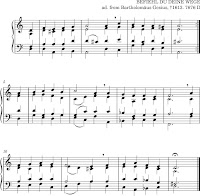For the lessons for this Sunday of the LSB three-year series, we're looking at Genesis 12:1-9, Romans 4:1-17 and John 3:1-17. And for once I feel like I can focus on the Gospel lesson without fear of plagiarizing myself.
A Pharisee, a ruler,
In all ways most complete,
By night came to the Rabbi,
Sat down at Jesus' feet.
"God must be with You, Master,"
Said this bright pearl of men;
To which the Savior answered,
"You must be born again."
This man, amazed, made banter
About this troubling word:
"Then can an old man enter
The womb again, my Lord?"
"Say water and the Spirit,"
Gave Jesus in reply;
"And do you flinch to hear it
Of which we testify?
"The wind blows and you hear it;
Whence, whither, no one knows.
So is it when the Spirit
Its image in you blows.
And if the means God chooses
You question and deny,
To what celestial uses
Shall I then testify?
"Are you amazed on hearing
You must be born again?
Wait but to witness, fearing,
When God atones for men.
For everyone who gazes
Upon His stricken Son
Will live to sing His praises
When this life's race is run."
O Savior, what hard sayings
It is Your lot to speak!
With what sardonic brayings
We answer, fat and sleek!
In baptism's water drown us;
Make ours Your borrowed tomb;
And with new wisdom crown us
Who meet You in the gloom.
Now, Father, who has given
For us Your only Son;
Now, Son, come down from heaven
To see salvation done;
Now, Holy Spirit, holding
Our secret hearts by night—
Bring on Your day, enfolding
All You so loved in light!
The tune above, BEFIEHL DUE DEINE WEGE ("Commit whatever grieves thee"), is based on a melody by the same composer who gave us MACHS MIT MIR GOTT ("Come, follow Me, the Savior spake" pretty much everywhere), GEDULD, DIE SOLL'N WIR HABEN ("While yet the morn is breaking" in TLH), HERRNHUT ("Jesus, Thy blood and righteousness" in LHy, SBH and ELHy), and O CHRISTE, MORGENSTERNE (yeah, you don't know it). I used the latter two in Useful Hymns; I think eventually I'll run through all five. Gesius's tunes just have a certain something that I like. Bold rhythm, maybe? Whatever the original tune was like, the version used here was adapted for a 1730 songbook edited by Georg Philipp Telemann. I suspect Telemann's editorial hand may be the reason this tune is the exception to that bold rhythm rule; but it's still a fine tune.
Subscribe to:
Post Comments (Atom)








No comments:
Post a Comment